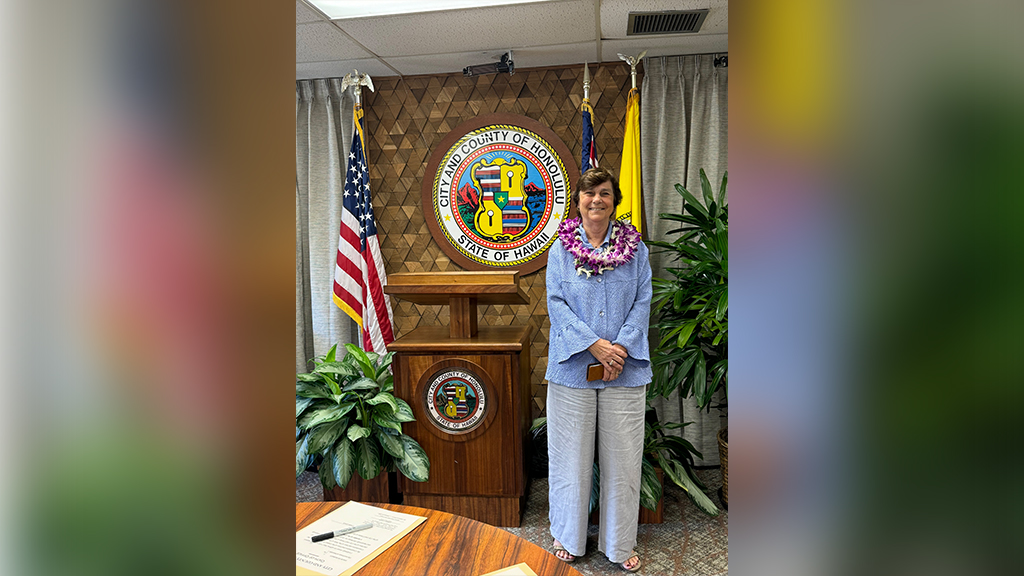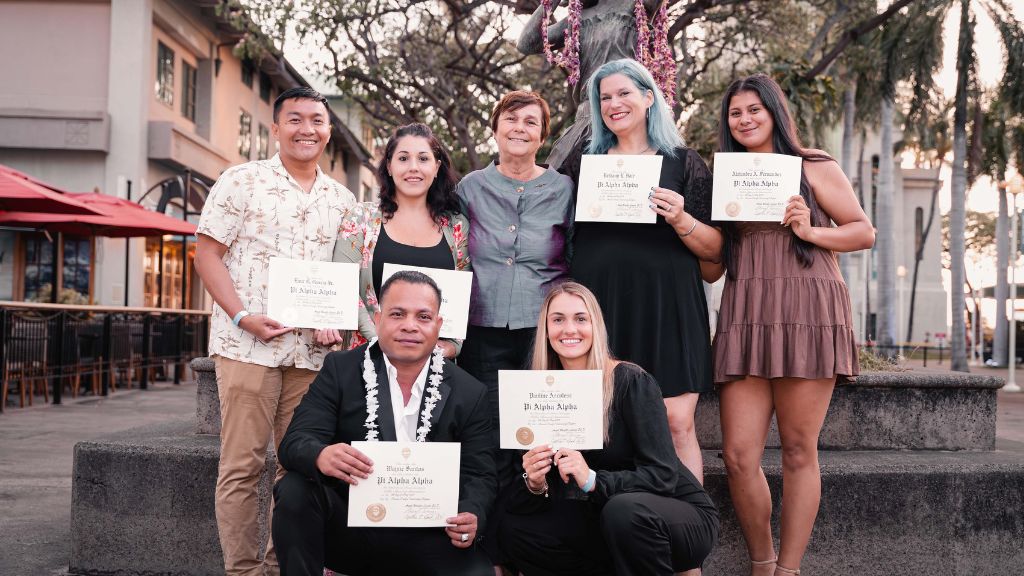
Cynthia Lynch, Ph.D., Commissioner, Honolulu City and County Ethics Commission, pictured at the swearing-in ceremony .
HPU Associate Professor of Public Administration Cynthia E. Lynch, Ph.D., was recently appointed by Mayor Blangiardi to the Honolulu City and County Ethics Commission. In addition to serving as faculty, Lynch is the Chair of the Master of Public Administration program in the College of Professional Studies and will bring a wealth of experience in ethical governance to her new role.
“I am deeply honored to be selected for this opportunity. It is a privilege to serve the people of Hawai‘i and I look forward to contributing to the ethical governance and integrity of our community,” she said.
Lynch has served on HPU’s faculty since 2014 where she teaches a wide range of public administration courses. She finds the capstone and research methods courses to be the most impactful because they allow students to delve deeply into topics they are passionate about, often leading to meaningful career opportunities.
“I have had students who have put the title of their capstone on their CVs, and they have actually gotten a job because of it,” she said.
Lynch’s introductory course to public administration is another one of her favorites. It covers the fundamentals of public management, including budgeting, personnel, and public policy, while also emphasizing the importance of democracy for civil service professions.
“Most students these days have not had a civics course since middle school,” she noted. “There are 69 questions on the Alabama Literacy Test, that was used until the early 1970s that determined whether an African American could vote in that state. The test takes 40 minutes, and you can get no more than 9 questions wrong. In nearly 20 years of teaching and having my students take this test themselves, no student has ever scored more than 40 correct answers. No student coming into the program would be eligible to vote. That’s why the introductory course is so important.”
While her passion for the subject is evident, her journey to becoming a public administration professional and educator was an evolution that occurred later in her life following a career as a chocolatier and pâtissier.
Journey from Chocolate to Ethics
Lynch launched her career in the culinary world running a successful chocolate and pastry business in Boston for a decade. But changes in her personal life coupled with the high cost of doing business in the city led her to sell the business and evaluate alternative career paths. “I had nightmares of having to work at the local grocery store, decorating birthday cakes in fluorescent pink,” she laughed.
This turning point propelled her to pursue an undergraduate degree in the College of Public and Community Service at University of Massachusetts, Boston. While there, she volunteered to work the registration table at a regional professional conference and a chance encounter with the then president of the American Society for Public Administration, Professor Thomas Lynch, which led to a life-changing partnership.
“I proceeded to tell him everything that I thought was terrible about the organization, especially how it was geared only towards graduate students,” she laughed. “He nodded appreciatively, thanked me for my comments, and then later asked me to dinner. I went and the rest is history.”
They married six months later, and encouraged by her husband, she went on to earn her master’s degree in public administration from Louisiana State University and later a Ph.D. at Southern University and A & M College where she also began her teaching career.
“I was reminded that my GRE scores were still valid from doing my master’s degree and was encouraged to apply to the Ph.D. program in Public Policy,” she explained. “Once I graduated, they hired me for my first teaching job.”
Since then, Lynch has served on the faculty at the University of Texas, Rio Grande Valley. She joined the HPU faculty after relocating to Hawai‘i and has been instrumental in shaping the curriculum and guiding students in courses such as Public Administration, Ethics, Organization Theory and Design, and Nonprofit Management.

HPU Associate Professor of Public Administration and Chair of the Master of Public Administration program Cynthia E. Lynch, Ph.D., is the advisor to the Pi Alpha Alpha Global Honor Society. She is pictured with 2023 HPU honor society inductees .
Pressing Issues in Public Administration Today
Lynch identifies several critical issues facing public administration today. Central to her concerns is the fragility of democracy and the essential role of public servants in upholding democratic values. She emphasizes the importance of ethical behavior and the courage to make principled decisions, even when faced with personal or professional risks.
“Democracy is delicate,” she explained. “Public servants must understand their oath is to the Constitution and the people, not to any political party or person. This understanding is crucial as we navigate the complexities of modern governance.”
Another pressing issue for Lynch is the need for comprehensive ethics training and professional designations for public service ethicists. Likening ethicists in public service to those in the medical and public health fields, she has been a vocal advocate for developing a structured approach to ethics in public administration, a vision she is actively pursuing through initiatives like the new graduate certificate in public service ethics at HPU.
Guiding Aspiring Public Administrators
Lynch’s advice to HPU students and aspiring public administrators is both practical and profound. She underscores the importance of critical thinking, ethical integrity, and a deep commitment to democratic principles. She encourages students to engage in self-reflection, understand their values, and be prepared to make tough decisions.
“It takes courage and dedication to be a public servant,” she said. “Follow the evidence, ask questions, and remain open to different perspectives. Your values should align with democratic principles, not ideological biases.”
She also stresses the importance of continuous learning and adaptation and advises students to stay informed about current issues, seek diverse viewpoints, and be willing to adapt their approaches based on evidence and outcomes.
“I encourage all my students to set their compass and understand their own value system,” she said. “Because there may come a time when you just need to step away from a job because your core values do not align with those of the organization or agency where you are working. And that’s really hard to do.”
Bringing a Fresh (Ethical) Perspective to the City and County
Lynch’s recent appointment to the Honolulu City and County Ethics Commission aligns perfectly with her extensive work in ethics. It also represents a significant milestone in her career, highlighting her dedication to upholding ethical standards in public service.
“Tom and I have been writing about ethics since the early ’90s,” she explained. “It is our firm belief that virtue ethics and Aristotelian principles in public administration are really important.” It is the subject matter of their 2019 book “Ethics and Professionalism in the Public Service.”
Her motivation to join the Ethics Commission stems from her passion for ethical governance. And her appointment is timely as the Commission works on crucial initiatives, such as setting gift limits for public employees, a measure that is two years in the making. “It’s a natural place to see if what we’ve discussed in the academic world can be put into practice,” she noted.
At HPU, Lynch hopes to continue to inspire and equip the next generation of public administrators with the knowledge and values essential for navigating the complexities of public service. And through her future work on the Honolulu City and County Ethics Commission, she will not only contribute to the ethical governance of Hawai‘i but also shape the future of public administration education and practice.
“Public service is not just an easy job or a great retirement plan. It’s a commitment to serving democracy in all its messiness,” she concluded.


